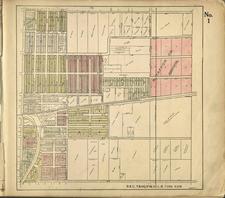Renumbering the Streets
 “City commissioners, nearly finished with their annual tax assessing tour of Springfield, have renewed an old conviction that the city direly needs to have its street renumbering project finished, the councilmen nearly got lost several times!
“City commissioners, nearly finished with their annual tax assessing tour of Springfield, have renewed an old conviction that the city direly needs to have its street renumbering project finished, the councilmen nearly got lost several times!
“Springfieldians have been becoming more conscious than ever of the hit and miss system and summer tourists complaining that they can never find Uncle John’s house unless Uncle John comes down town to lead the way.
“But the renumbering project is up against serious difficulties. Remember the street renumbering project? It was started about a year ago with a group of WPA workers assigned to check over city plats and to work out a uniform house and street numbering system. The system was to start counting from the Public square, giving each street a number north, south, east or west. House numbers were to be designated in accordance with block numbers.
“The plan called for concrete street markers bearing both the name of each street and its number. It also called for correcting some very inconsistent things about Springfield’s city layout.
“It would do away with one of the two 1100 blocks on North Rogers. It would straighten out the names of West Elm and Lincoln Streets, which cross each other near the west city limits. Most of the way out Elm, Lincoln is south of you. But suddenly Elm picks up in line with Lincoln Street, and Lincoln Street continues from where the original line of Elm leaves off.
“There are as many as four names for a single street crossing the city, and there are as many as three streets bearing the same name.
“‘We almost went crazy,’ chorused the councilmen.
“The renumbered city plats are all finished now and filed away.
“The new block and house numbers are ready to be assigned, and you would think that the end of confusion was just around the corner. But the next steps in the renumbering plan are the expensive ones, they require purchase of hundreds of street sign posts and thousands of house numbers.
“The council conceded long ago that it would have to give numerals to every house in the city in order to achieve uniformity. There are about 18,000 or more homes in Springfield and outlying areas given city numbers, and buying numbers for all would represent a big price.
“Concrete street markers are preferable, Street Commissioner O.L. Barbarick said, because they are less vulnerable. In the street department material yard is a big stack of mutilated street signs, representing an investment of several hundred dollars. They have been shot at, swung on and bent until they had to be removed. Most of them are only a few years old.
“The counsel [sic] doesn’t know when it can go ahead with the renumbering. A lot of people don’t want their numbers changed, but the city is coming in for ridicule and fuming on the part of an increasing number of visitors who are being brought here by the defense program.
“Maybe, the council hopes, the job can be financed next year.” News & Leader June 29, 1941
Springfield residents witnessed several address renumbering projects throughout the city’s history. One of the largest renumbering projects happened in 1947, with most Springfield businesses and residences renumbered and several streets renamed. These renumbering projects add challenges to property research, as researchers need to know the pre- and post-renumbering addresses. Local History staff developed an address conversation database for the 1947 renumbering project, allowing researchers to quickly identify the pre- and post-1947 addresses for Springfield businesses and residences. Contact Local History at the Library Center for help researching your Springfield property. The map above is from the Library's collection.
Find this article at